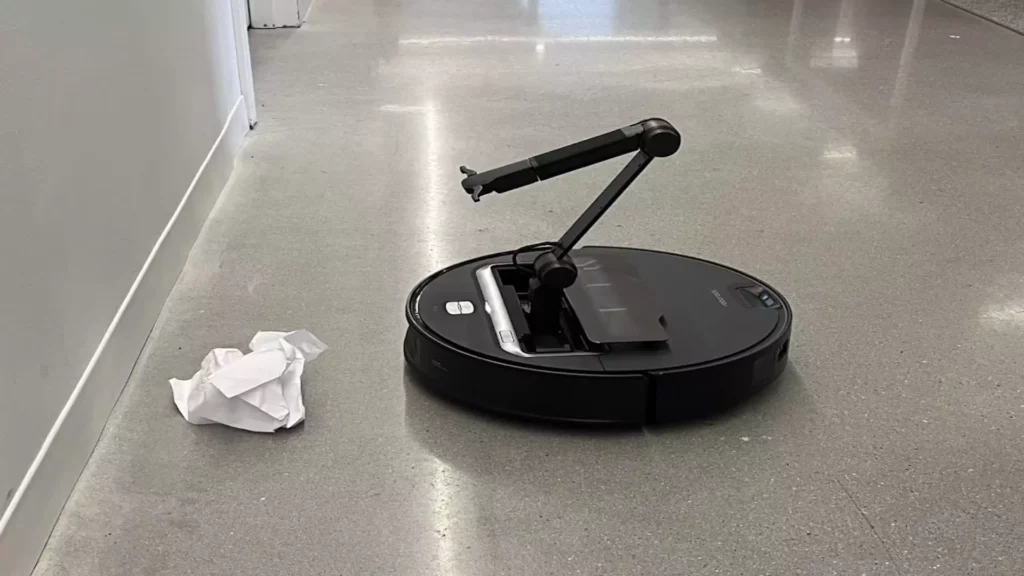In a remarkable showcase of innovation, Roborock, a prominent Chinese company specializing in robotic vacuum cleaners, has unveiled its latest model, the Saros Z70. This advanced robot vacuum comes equipped with a groundbreaking feature: a folding arm that employs artificial intelligence (AI) to efficiently remove commonly obstructive household items such as socks, towels, and sandals. This development signals a significant shift in how we perceive vacuum cleaning technology and what role it might play in our daily lives.
Roborock’s president, Quan Gang, is optimistic about the future of robotic cleaning devices, forecasting that within three years, these machines could become as commonplace in households as washing machines. This perspective is rooted in the rapid advancements in artificial intelligence and its potential to enhance the functionality of robotic products. In an insightful interview, Quan conveyed his belief that the ongoing AI revolution could fundamentally transform how consumers interact with such technology, making them more integral to household management.
The concept of AI-infused robotic vacuums is not merely speculative; it is grounded in substantial technological development. The Saros Z70’s ability to identify and remove lightweight obstructions reflects a significant leap from traditional robotic vacuums, which often require human intervention to clear barriers. The practical application of these advancements will likely address a common consumer complaint: the need for constant monitoring of robotic vacuums while they operate. As the Saros Z70 prepares for its launch in major markets, all eyes will be on Roborock’s ability to deliver on its ambitious promises.
Market Dynamics and Competitive Landscape
Roborock’s debut is timely, considering the growing market for smart home devices. Since the introduction of the Roomba by iRobot in 2002, consumer expectations for robotic vacuums have evolved. The market has become increasingly crowded with various players, many of whom are vying for consumer attention with competitive price points and unique features. Notably, the company’s recent models have received accolades from leading tech publications, highlighting their superior performance and innovative capabilities.
Despite the acclaim, Roborock’s devices are not without their price tag, with high-end models like the S8 MaxV Ultra retailing for nearly $1,800. This suggests that while they may be celebrated for their technology, accessibility remains a barrier for many potential consumers. The challenge of balancing performance, price, and consumer accessibility is something that Roborock and its competitors must navigate carefully to foster broader adoption.
The low penetration rates of robotic vacuums in both developed and developing countries further underline the potential for growth in this market. With current ownership rates hovering just above 10% in developed nations, the introduction of AI technology could be the catalyst necessary to break through consumer hesitancy. By showcasing the tangible benefits of AI integration, Roborock may successfully appeal to a wider audience.
Roborock’s commitment to innovation is illustrated by its substantial investment in research and development, a crucial factor in maintaining competitive advantage. According to reports, the company allocated approximately 9.1% of its operating revenue towards R&D in the first three quarters of 2024, an increase from previous years. This proactive approach not only enhances product features but also positions Roborock as a leader in intelligent home solutions.
Quan highlighted the establishment of dedicated research facilities in Shanghai and Shenzhen, emphasizing the importance of fostering an environment focused solely on technological advancement. These facilities are staffed by talented researchers whose sole objective is to explore innovations unhindered by the commercial pressures often faced by product development teams. This paradigm encourages breakthroughs that will keep Roborock at the forefront of the rapidly evolving robotic vacuum landscape.
However, expanding this research team to meet the growing demands of the market presents challenges, particularly in sourcing qualified talent. As technology continues to advance, the competition for skilled researchers is likely to intensify, making it essential for Roborock to develop strategies to attract and retain top talent in the field.
Roborock’s introduction of the Saros Z70 encapsulates a future where AI technology revolutionizes everyday household chores. As the line between traditional cleaning devices and smart technology continues to blur, consumers can anticipate a new standard of convenience. The trajectory that Roborock is navigating may not only establish its products as household staples but may also inspire further developments in smart home devices.
The ultimate test for Roborock will be its ability to execute its vision effectively, balancing innovation with affordability and consumer accessibility. As home technology continues to advance, the landscape of household care is set to evolve dramatically, and companies like Roborock are poised to lead the charge into this exciting future.

